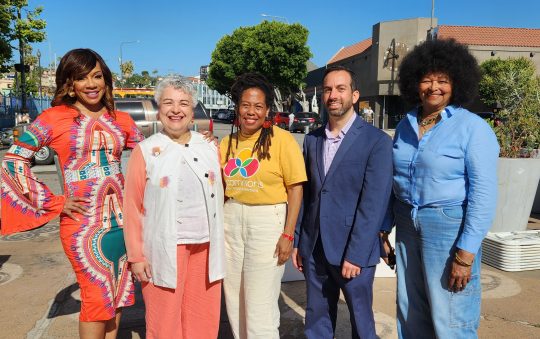
The picture of Vice President Mike Pence standing stiffly next to the trusted younger sister of North Korean dictator Kim Jong-Un at the Olympics in South Korea spoke a thousand words.
After weeks of escalating tensions, the North Korean dictator decided to use the Olympics to reach out to South Korea and to the world. He sent North Korean athletes to the games. The two Korean teams marched into the Olympic arena under a unified flag. They fielded a joint women’s ice hockey team for the first time. Kim’s sister not only attended the ceremonies, but also issued an invitation to the South Korean president to make an official visit to the North after the games.
Vice President Pence came to the games to enforce the administration’s no-talk policy. He stiffed Kim’s sister on the podium. He and his wife refused to join the crowd in standing when the Koreans marched in.
“We will not allow North Korean propaganda to hijack the message and imagery of the Olympic Games,” he said, vowing to focus on North Korean provocations and human rights abuses, while promising new and harsher sanctions.
But the “message and imagery” of the Olympic Games is that athletes of all nations put aside bitter conflicts to compete in contests. The space for peaceful sports competition could create the opening for serious talks.
When campaigning for the presidency, South Korean President Moon Jae-in promised an opening to North Korea. The jarring North Korean tests of nuclear bombs and ballistic missiles cast a pall on that. President Donald Trump responded with a characteristic combination of insult and bluster. He infamously strutted that he had a “bigger (nuclear) button” than the North Korean president.
The administration ratcheted up sanctions, pushed China to get Kim under control, declared that North Korean possession of nuclear weapons was a dire national security threat and ramped up military exercises to the very borders of the North.
For our South Korean allies, the escalating threats are bone chilling. There is no rational military “option” against North Korea. A pre-emptive attack would be an illegal act of aggression that would lead to massive casualties in both North and South Korea and make the U.S. a pariah among nations.
Worse, the military threats only make the North Korean leadership less likely to negotiate away their nuclear weapons program. The U.S. sees North Korean nuclear weapons as offensive, threatening the U.S. and our allies. North Korea clearly sees its nuclear weapons as defensive. For an isolated dictatorship that is denounced by the U.S., a nuclear weapons capacity may serve the same purpose the U.S. claims for its own nuclear arsenal — deterring any country from attacking.
President Moon would clearly like to lessen tensions and move toward better relations. He has no desire to distance himself from the U.S., but would like to bring the U.S. and North Korea to the negotiating table.
What do Trump and his advisers want? The no-talk, big-stick policy leads to a dead end. North Korea already has nuclear weapons. Severe sanctions have not slowed its development of intercontinental missiles.
The Chinese suggest that talks could start if the U.S. suspends its regular joint military exercises with South Korea and North Korea responds by suspending nuclear and missile tests. Neither the U.S. nor North Korea has expressed support for that.
Kim vows to “mass produce” nuclear weapons; Pence demands that North Korea begin “denuclearization,” the dismantling “permanently and irreversibly” of North Korea’s nuclear and ballistic missile programs before there are any negotiations or loosening of sanctions or suspension of military exercises.
A no-talk, all-swagger policy has produced nothing. If escalating military exercises and threats don’t produce a war by miscalculation, they end up advertising the impotence of U.S. policy.
Diplomacy isn’t a surrender; it is an opening. The only way North Korea will give up its nuclear weapons is if it can receive concrete guarantees against foreign attack. The only way we can live with North Korea having nuclear weapons is with dialogue and mutual steps to build trust and security.
North Korea is a ruthless dictatorship with a failed economy. South Koreans are understandably fearful of war, but not exactly eager to bear the cost of rebuilding the North. Kim has made an opening gesture at the Olympic Games. Both South Korea and the U.S. have every reason to call his bluff, to seek discussions rather than to continue a no-talk policy that leads only to greater tension and frustration.







